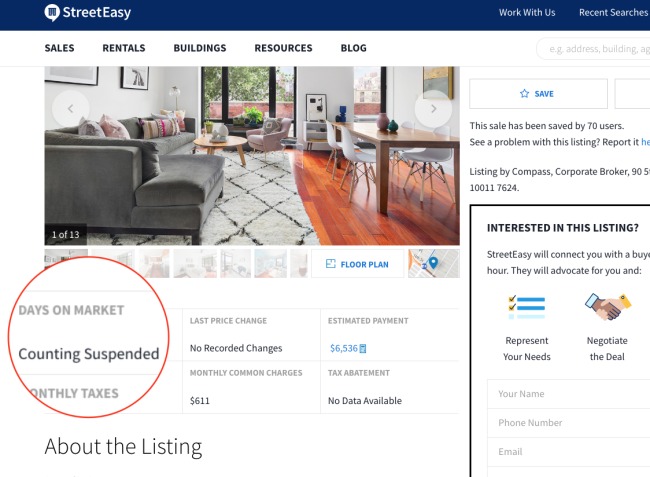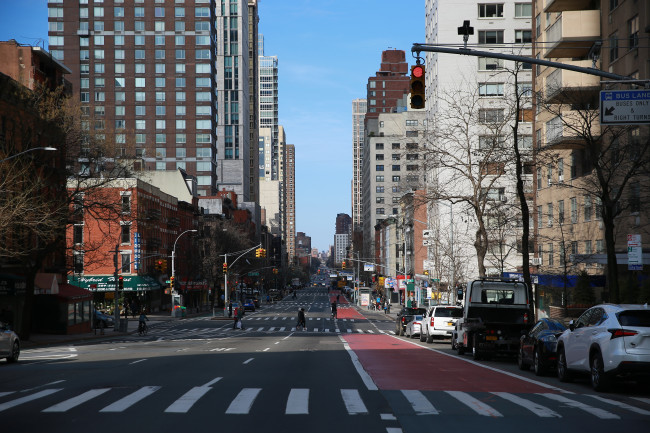Airbnb hosts and short-term rental companies grapple with empty rooms as travel to NYC halts

A room at Outpost Club's Central Park Manhattan House. The company is offering low-cost housing to medical professionals who are in the city to fight the coronavirus.
New Yorkers who rent out their apartments on Airbnb and other vacation stay platforms saw their bookings evaporate as a result of the coronavirus outbreak. Short-term rental companies are also reeling as tourism and business travel has ground to halt in the city, where all non-essential businesses are closed.
For companies like Sonder and Lyric, the drop in demand has resulted in major layoffs. Other small landlords are opting to offer longer leases, according to roommate matching site SpareRoom. The co-living company Outpost Club is making use of empty rooms by offering low-cost rentals for doctors and nurses coming to NYC, the epicenter of the coronavirus epidemic.
Editor's note: Click here for more of Brick Underground's coronavirus coverage. This story was updated on April 1, 2020.
Airbnb hosts receive a double blow
New Yorkers who use the Airbnb platform to rent out their places suffered a double whammy when the company changed its policy to allow guests who booked before March 14 to cancel without penalty because of the coronavirus. [UPDATE: Airbnb's CEO announced a relief package and issued an apology but hosts say the relief is too little too late.]
One Brooklyn host, who asked not to be named, says he was booked solid from mid-March through May, before losing 80 percent of his bookings.
“The remaining 20 percent will cancel, too, I'm sure. We also had two cancellations for June and one for July. Total new bookings for the last month are a perfect zero,” he says.
Between February and mid-March, Airbnb lost tens of millions in bookings, according to an analysis by The Real Deal. The company had been readying for a public offering this year, which is now in question.
But as painful as the expanded Airbnb cancellation policy is, the Brooklyn host says it was the right thing to do.
“People shouldn't travel and, in many cases, they can't travel, and even if they could and did, there would be nothing for them to do in NYC. Airbnb is also refunding its booking fee, which it doesn't do for run-of-the-mill cancellations,” he says.
He’s committed to staying the course as an Airbnb host, for now.
“Once we're through this, travel will gradually recover, I suppose. We've also invested time and money furnishing and outfitting the apartment and aren't ready to forfeit that. If we're still hearing crickets in September, we'll need to reassess, of course,” he says,
Other hosts are not as sanguine.
Michelle Himden is the founder and CEO of cityami.com, a boutique firm that manages about 200 rentals on Airbnb and other platforms for stays over 30 days. Her clients, owners and renters who travel frequently for extended periods, are “sweating bullets” right now, she says.
She says that 90 percent of bookings “abruptly left, most with no notice, when the city shut down.” And to make matters worse, when Airbnb refunded the guests, the refunds were for the full amount.
Her company is trying to rent out the apartments again, but in some cases, the apartments have not been released to the system and are still tied up by the cancellations.
“We’ve dropped our rent to cost because we’re trying to be good citizens,” she says, “We’re cross-posting apartments on multiple sites and turning to hospitals to reach nurses and doctors who don’t want to stay in hotels."
She argues that hosts shouldn’t have to bear the brunt of these costs.
“Of course guests should get refunds. But it shouldn’t be the person hosting them that has to pay. There are a lot of angry people, including myself,” Himden says. As a small business owner, she’s worried about paying her team and it “could be months before we get any aid from the state.”
There may be relief from the federal government as well: Airbnb tells Reuters that the new $2 trillion coronavirus stimulus bill approved by the Senate last night provides unemployment assistance for hosts or hosts with family members diagnosed with Covid-19 and small business loans for hosts who are considered sole proprietors. The company also is also connecting hosts who want to offer free or subsidized housing to healthcare workers and other to fight the pandemic.
Demand plunges for short-term rentals
In the days after NYC shut down public schools, restaurants, and bars, Roommate-matching site SpareRoom saw a 19 increase in ads from landlords in New York as they rushed to fill rooms before more stringent social distancing rules went into effect. It's a sign owners are shifting away from short-term rental platforms and opting for longer-term rentals. Renters are also using video calls to meet their potential roommates online now that social distancing rules are in effect, says Matt Hutchinson, director of SpareRoom.
Some major companies have been hit hard by the pandemic. Sonder laid off or furloughed 400 people—one third of its workforce—on March 24, according to The Information. Lyric, which is backed by Airbnb, has laid off most of its employees, according to The Real Deal, which reports that the company will keep 132 units online at 70 Pine St. in Manhattan, but other locations are in “flux.”
A co-living pivot to medical housing
Co-living companies, which also offer more flexible leases than traditional rentals, face the same headwinds as other short-term rental companies.
Outpost Club, which took over a few of the troubled Bedly locations, announced it is creating housing for traveling medical staff in New York and New Jersey as well as San Francisco.
“Interns and corporate clients represented about 40 percent of our tenants prior to this crisis. As those tenants started to cancel or leave to return home, we started to re-group the other tenants in a way that could free up some apartments and even houses,” says Sergii Starostin, CEO of Outpost Club.
The freed-up housing is being offered at a special rate to healthcare workers and also college students who were pushed out of their dorms. The students have been added to existing houses, while healthcare workers will have their own dedicated spaces, Starostin says.
“We had been thinking of ways over the last week that we could be helpful in the fight against Covid-19. We recognized the cities in which we work are some of the hardest hit and are in need of an influx of medical staff over the next several weeks on a short-term basis,” he says.
The company is offering medical professionals two flat rates, $990 or $1,190 per month, including utilities, depending on the location selected. There is no security deposit and medical staff can stay month to month. Interested applicants can go to outpost-club.com and use the referral code “HEROES.” Once an application is received, they can move in within 24 hours.
You Might Also Like



























